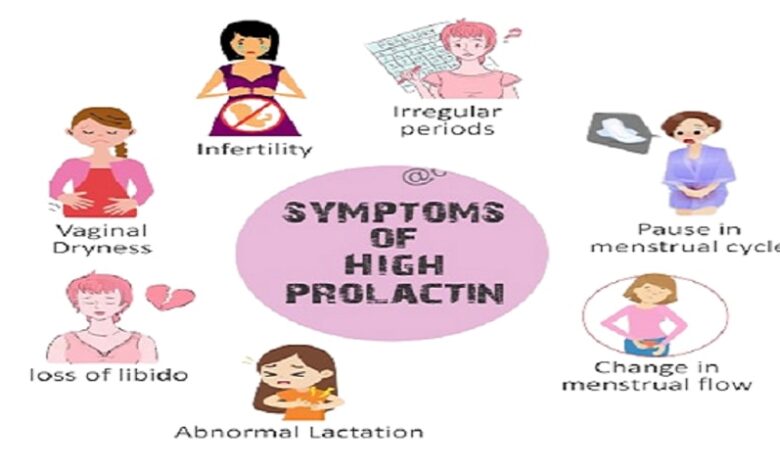Signs of Elevated Prolactin Levels: A Comprehensive Guide for Women

Prolactin and Its Impact on Women’s Health: A Comprehensive Overview
It is imperative to comprehend the influence of prolactin levels on the health and well-being of women. Prolactin is frequently associated with lactation; however, it is also involved in a variety of other biological processes. A diverse array of symptoms that impact both mental and physical health may result from elevated prolactin levels. The causes, repercussions, and methods of managing this hormone imbalance will be examined in this article, which will also examine the symptoms of elevated prolactin levels that all women should be aware of.
An Overview of the Hormone Prolactin
Prolactin, a hormone that is recognized for its ability to facilitate milk production during pregnancy and lactation, is secreted by the pituitary gland.
Cabergoline 0.5mg is used to treat a variety of illnesses that arise from excessive production of the hormone prolactin. It may be used to treat pituitary prolactinomas, which are tumors of the pituitary gland, as well as certain menstruation issues and issues with fertility in both sexes.
The Role of Prolactin in the Body of Women
Prolactin regulates a woman’s menstrual cycle, immunity, metabolism, and mental health, in addition to lactation.
Prolactin-Inducing Drugs and Medications
A variety of medications, such as analgesics, antipsychotics, and antidepressants, may induce an increase in prolactin levels in the body.
Elevated prolactin is indicative of underlying medical conditions
Medical conditions including hypothyroidism, polycystic ovarian syndrome (PCOS), and pituitary tumors may all result in an increase in prolactin.
Differences in girth and tenderness
Breast discomfort, enlargement, or discharge that is not associated with lactation may result from elevated prolactin levels in women.
Irregularities that occur during the menstrual cycle
If prolactin levels are elevated, it may be challenging to conceive and may result in irregular or lack of menstruation.
Mood fluctuations and emotional sensitivity
Prolactin levels may be elevated in women who experience mood fluctuations, aggression, anxiety, or melancholy.
Impacts on Libido and Function
High levels of prolactin may also impact libido, resulting in a decreased desire for sex or difficulties with sexual function.
Problems with Infertility and Anovulation
High levels of prolactin may disrupt the production of menstrual hormones and ovulation, resulting in infertility and irregular menstrual cycles. Anovulation, a condition in which the ovaries fail to release an egg, may result in infertility in women with elevated prolactin levels.
Cabergoline Treat high concentration of the hormone prolactin in the blood is known as hyperprolactinemia. During breastfeeding, the pituitary gland releases the hormone prolactin, which primarily boosts milk production. Among the many health issues that may arise from an abnormal rise in prolactin levels are menstrual cycle abnormalities, infertility, and erectile dysfunction. Cabergoline eliminates these issues by regulating prolactin levels.
Potential implications for pregnancy and breastfeeding
The fetus’s growth and development may be influenced by elevated prolactin levels during pregnancy, which may alter the production of other critical hormones. Additionally, the production and feeding of milk after childbirth may be impeded by elevated prolactin levels.
Prolactin levels are assessed through diagnostic assays
Blood testing may be implemented by physicians to identify elevated prolactin levels. Enhanced readings may suggest that there are underlying medical issues that necessitate additional testing and treatment.
Medications and Lifestyle Changes for the Management of High Prolactin
Medications that reduce prolactin production or therapy for underlying issues, such as pituitary tumors, are viable alternatives for managing elevated prolactin levels. It may also be beneficial to modify one’s lifestyle to incorporate stress reduction, sufficient sleep, and a nutritious diet in order to regulate prolactin levels.
The Significance of Seeking Medical Assistance and Counseling
Women who are experiencing symptoms associated with elevated prolactin levels should seek medical advice and assistance. Prompt diagnosis and appropriate management may alleviate issues and enhance overall health outcomes.
Methods of Natural Control for Prolactin Levels through Lifestyle
In addition to pharmacological interventions, the body’s natural regulation of prolactin levels may be facilitated by the incorporation of stress-relieving activities, such as yoga or meditation, the maintenance of a healthy weight through regular exercise, and the consumption of a nutritious diet that is rich in vitamins and minerals. It is important to bear in mind that a comprehensive approach that encompasses lifestyle and pharmaceutical modifications is more effective in managing elevated prolactin levels.
Final Thoughts on the Symptoms of High Prolactin Levels
Women must be cognizant of the indicators of elevated prolactin levels in order to preserve their optimal health. It is possible to address any underlying issues and attempt to restore hormonal balance by promptly identifying symptoms and seeking appropriate medical treatment. It is important to bear in mind that proactively minimizing prolactin levels may ameliorate discomfort and enhance overall health. Retain your power, remain informed, and prioritize your health.




